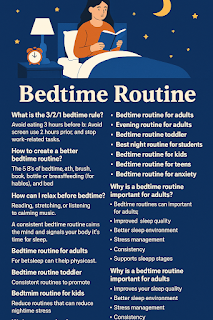🌙 Bedtime Routine: Your Secret to Better Sleep and Success
A healthy lifestyle isn’t just about clean eating and exercise – your bedtime routine plays a powerful role too. Whether you’re an adult struggling with stress, a student burning midnight oil, or a parent establishing routines for kids, a calming evening ritual helps your mind and body wind down naturally for deeper rest and better energy.
💡 What is the 3/2/1 bedtime rule?
The 3/2/1 bedtime rule is a simple strategy for better sleep:
👉3 hours before bed: No heavy meals.
👉2 hours before bed: Stop working.
👉1 hour before bed: Avoid screens.
Following this helps your digestion, relaxes your mind, and reduces blue light exposure, signalling your brain to prepare for sleep naturally.
💡 How to create a better bedtime routine?
Here are practical steps to create a bedtime routine for adults, kids, and teens:
1. Set a consistent sleep schedule.
2. Practice calming rituals (reading, journaling, or light stretching).
3. Limit caffeine in the evening.
4. Use dim lights to signal sleep time.
5. Try the 5 B’s of bedtime for kids and toddlers.
💡 What are the 5 B's of bedtime?
For babies and toddlers, the 5 B’s bedtime routine builds comfort and security:
1. Bath – warm bath to relax.
2. Brush – brush teeth.
3. Book – read a bedtime story.
4. Bottle/Breast – final feed for babies.
5. Bed – into their sleep space calmly.
This sequence signals sleep readiness and reduces bedtime struggles.
💡 How can I relax before bedtime?
Here are natural ways to relax before sleep:
✔️ Practice deep breathing
✔️ Write down worries to clear your mind
✔️ Do gentle yoga or stretching
✔️ Read a physical book (avoid screens)
✔️ Listen to calming music or sleep meditations
🌙 Bedtime Routine Examples for All
✅Bedtime routine for adults: Warm shower, herbal tea, gratitude journaling, lights off at fixed time.
✅ Bedtime routine for students: Review notes calmly (not cramming), read for pleasure, set alarm, lights out.
✅ Bedtime routine baby: Bath, feed, lullaby, cuddle, crib with dim light.
✅ Bedtime routine toddler: Bath, brush, story time, cuddle, bed.
✅ Bedtime routine for kids: Brush teeth, bedtime story, positive affirmations, bed.
✅ Bedtime routine for teens: Limit phone use, skincare, reading, set next day goals, bed.
✅ Bedtime routine for anxiety: Journaling worries, deep breathing, aromatherapy, mindfulness meditation, bed.
💡 Night time routine for success
Many successful people have evening routines that include:
☣️Reviewing goals
☣️Preparing for the next day
☣️Disconnecting from work mentally
☣️Reading to gain wisdom
☣️Sleeping early for optimal performance
💡 Why is a bedtime routine important for adults?
1. Regulates sleep cycles naturally
2. Reduces stress and anxiety level
3. Improves focus and productivity next day
4. Supports healthy hormones and metabolism
5. Creates a sense of calm and control
6. Enhances emotional wellbeing
A structured evening routine helps your body know when to wind down, improving sleep quality, mental clarity, and overall health.
💡 Bonus: Bedtime routine for adults worksheet
📝 Try this quick evening checklist tonight:
✅ Dinner before 3 hours of bed
✅ No work tasks 2 hours before bed
✅ Screen-free 1 hour before bed
✅ Warm shower or bath
✅ Gratitude journaling or reading
✅ Lights out same time daily
✨ Final Thoughts
Creating a bedtime routine is not just for kids. As an adult, it’s your secret weapon for better sleep, balanced health, and success in daily life. Start small today.









.png)



